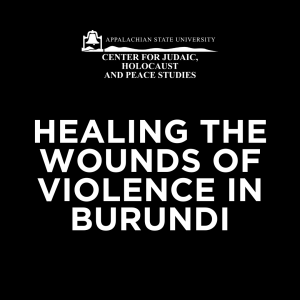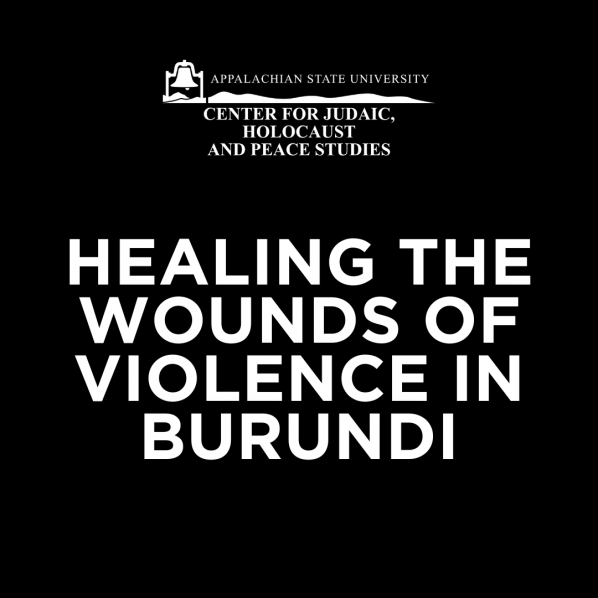"Healing the Wounds of Violence in Burundi" with Janvier Manirakiza and Barry Thomas
Date & Time: Thursday, April 4, 2024, from 6-8 p.m.
Format: Hybrid
Location: Room 114, Belk Library & Information Commons
Zoom: Register at https://appstate.zoom.us/webinar/register/WN_HRE0UfypRtubDJtAb--B-Q to receive the link.
BOONE, N.C. — Appalachian State University's Center for Judaic, Holocaust and Peace Studies (CJHPS) is pleased to host Janvier Manirakiza and Barry Thomas on Thursday, April 4, 2024. Their lecture, titled "Healing the Wounds of Violence in Burundi," will take place from 6-8 p.m. in Belk Library & Information Commons Room 114 and via Zoom. The Zoom link is available upon registration here.
The lecture will describe the key elements of Burundi’s tragic history, including the mass killings in 1972 of 200,000 of the educated male Hutu citizens and in 1993 with the killing of 50,000 ethnic Tutsis. Burundi is a small, land-locked country in East Africa bordering Rwanda. As Barry Thomas will explain, its post-colonial history, beginning in the early 1960s, has been marked by persistent, unstable leadership and governance, ethnic rivalry, oppression, violent conflict, growing hatred, and tit-for-tat atrocity and retribution. You will hear a firsthand witness of “these Crisis Years (1993-2005),” described by the then United States Ambassador as a kind of “creeping genocide” while the Burundian people refer to it as “The Crisis.” Speaker Janvier Manirakiza was a boy during “The Crisis.” He will talk about what life during then meant to him and other young people. He will close with what he, his colleagues, and others of his generation are doing to build a future based upon reconciliation, peace, and hope through his organization, called “Dreaming for Change.”
About Janvier Manirakiza
Manirakiza is the founder and executive director of Dreaming for Change (D4C). Manirakiza was born and raised in Burundi, experiencing poverty and extreme violence as a child during the Burundian Civil War. His childhood experiences led him to found D4C, a nonprofit peace organization working to improve the health and wellbeing of women and children in Burundi and East Africa, with a focus on early childhood development, teachers’ training, girls’ education, women entrepreneurship, vocational training, food security, and community infrastructure. He has won numerous awards for his work including the Obama Foundation Africa Leaders Program; YALI Regional Leadership Center East Africa’s Transformation Fund Award, USAID; YALI Alumnus at Kenyatta University; and, in 2024, the Mandela Washington Fellow-in-Residence at Appalachian State University. Manirakiza is committed to bringing meaningful contributions to the people of Burundi, and he believes that the right education and development opportunities can strongly contribute to peace, economic stability, and community healing.
About Barry Thomas
Following a career in corporate executive management in the paper industry with responsibilities for strategic planning, finance, and operations, Thomas spent the 1990s into the new century working in post-collapse Russia on the privatization of the state-owned assets and, then, on private business development in the forest products industry and in pharmaceutical distribution. For several years beginning in 2004, he lived and worked in East Timor as advisor to Nobel Peace Laureate and President Jose Ramos Horta on matters of strategy, peacebuilding, and community development. Thomas holds a bachelor’s degree in economics from Wesleyan University, an MBA from Stanford University, and a master’s degree in conflict resolution from Antioch University. Now retired and living in the mountains of North Carolina, he remains active in peacebuilding and community development through his support of a growing NGO in Burundi, East Africa.
Organized by the CJHPS, the program is free and open to the public and co-sponsored by Appalachian State's Department of Anthropology, Department of History, and Office of International Education and Development. For a disability accommodation, visit odr.appstate.edu.
For more information about the lecture, visit holocaust.appstate.edu/events/manirakiza-and-thomas.
Questions? Contact CJHPS via email at holocaust@appstate.edu or via phone at (828) 262-6118.
###
About the Center for Judaic, Holocaust and Peace Studies
Appalachian State University’s Center for Judaic, Holocaust and Peace Studies was established in 2002 to develop new educational opportunities for students, teachers and the community. Located administratively within the College of Arts and Sciences, the center’s vision promotes tolerance, understanding and respect for all human life. To accomplish this vision, the center works to strengthen tolerance, understanding and remembrance by increasing the knowledge of Jewish culture and history, teaching the history and meaning of the Holocaust and utilizing these experiences to explore peaceful avenues for human improvement and the prevention of further genocides. Learn more at https://holocaust.appstate.edu.
Written by Amy Hudnall
Edited by Lauren Gibbs
March 18, 2024
BOONE, N.C.

